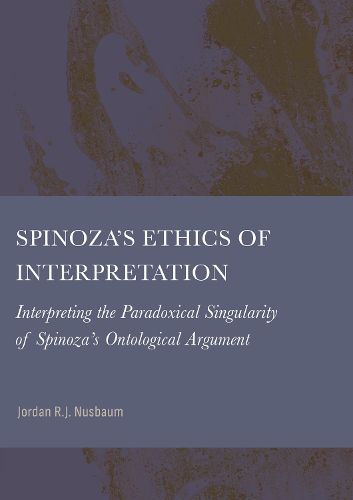Readings Newsletter
Become a Readings Member to make your shopping experience even easier.
Sign in or sign up for free!
You’re not far away from qualifying for FREE standard shipping within Australia
You’ve qualified for FREE standard shipping within Australia
The cart is loading…






This title is printed to order. This book may have been self-published. If so, we cannot guarantee the quality of the content. In the main most books will have gone through the editing process however some may not. We therefore suggest that you be aware of this before ordering this book. If in doubt check either the author or publisher’s details as we are unable to accept any returns unless they are faulty. Please contact us if you have any questions.
This book examines Spinoza's ontological argument and introduces the concept of 'paradoxical singularity.' It explores the ways in which Spinoza's ontology establishes a framework in which singular things are, paradoxically, differentiated through intersecting causes. The book argues that Spinoza's ontological argument functions at once as a philosophical, religious, and political ethos in which interpretation is inseparable from cooperation. This emphasizes a connection between the productions of knowledge (interpretation) and the way of life (ethos) that those productions involve and express. Recommended for scholars interested in Spinoza's influence on post-structuralism, trans-individuality, and the history of secular religious thought.
$9.00 standard shipping within Australia
FREE standard shipping within Australia for orders over $100.00
Express & International shipping calculated at checkout
This title is printed to order. This book may have been self-published. If so, we cannot guarantee the quality of the content. In the main most books will have gone through the editing process however some may not. We therefore suggest that you be aware of this before ordering this book. If in doubt check either the author or publisher’s details as we are unable to accept any returns unless they are faulty. Please contact us if you have any questions.
This book examines Spinoza's ontological argument and introduces the concept of 'paradoxical singularity.' It explores the ways in which Spinoza's ontology establishes a framework in which singular things are, paradoxically, differentiated through intersecting causes. The book argues that Spinoza's ontological argument functions at once as a philosophical, religious, and political ethos in which interpretation is inseparable from cooperation. This emphasizes a connection between the productions of knowledge (interpretation) and the way of life (ethos) that those productions involve and express. Recommended for scholars interested in Spinoza's influence on post-structuralism, trans-individuality, and the history of secular religious thought.